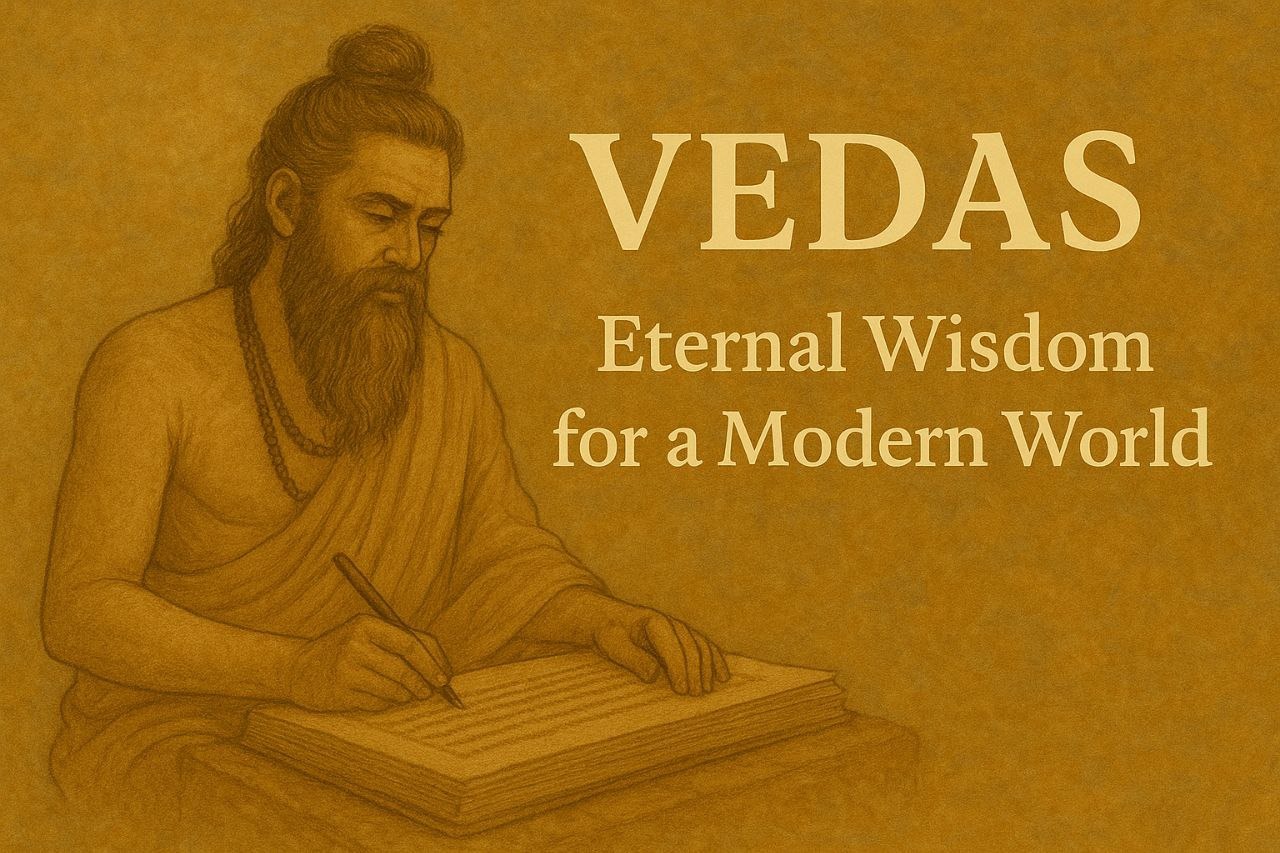Relevance of the Vedas Today ~ Eternal Wisdom for a Modern World

The Vedas, the most ancient scriptures of Sanatan Dharma, are often perceived as archaic hymns composed by seers thousands of years ago. But are they still relevant in the 21st century? Are they merely books of rituals and chants, or is there a timeless wisdom encoded in their verses?
In a world of artificial intelligence and space exploration, the Vedas still stand as a beacon of eternal truth, offering insights not just into divinity, but into human psychology, cosmology, society, and the art of living harmoniously with nature.
📜 What Are the Vedas?
The word "Veda" means knowledge. They are apauruṣeya, not authored by humans, but revealed to the Ṛṣis (seers) in deep meditative states. The four Vedas, Rigveda, Yajurveda, Sāmaveda, and Atharvaveda, are not religious dogmas, but vibrations of universal truths, captured in sound and language.
They address every aspect of existence, from creation to consciousness, from rituals to realization.
🔍 Vedas as a Guide for Modern Life
Despite their ancient origin, the essence of the Vedas is incredibly modern and relevant. Here’s how:
1. Holistic Science of Life
The Vedas are the first texts to view life as a complete system ~ body, mind, and spirit. In a time where mental health, sustainability, and inner peace are increasingly important, Vedic principles provide a roadmap for integrated living.
2. Harmony with Nature
In the Vedas, nature is not a resource but a living force. Agni (fire), Vāyu (air), Āpas (water), Pṛthvī (earth), are all devatās to be respected. The eco-spirituality of the Vedas is a remedy to today’s environmental crisis.
3. Unity in Diversity
The Vedic vision is not divisive. It is an inclusivist, "Ekam sat viprāḥ bahudhā vadanti", Truth is one; sages call it by various names. This idea is critical in a world divided by religious intolerance.
4. Self-Inquiry and Inner Truth
The Vedas place great emphasis on svadharma (one’s inner nature) and ātma-jñāna (self-knowledge). Rather than blind belief, they invite the seeker to inquire, contemplate, and realize the truth directly.
🧠 Vedas & Contemporary Thought
Great minds, Swami Vivekananda, Aurobindo, Carl Jung, Oppenheimer, and even Einstein, have acknowledged the depth of Vedic thought.
"In the Vedas, I have found truths that transcend time. They are not just ancient Indian texts; they are a universal vision of life." ~ Adarsh Singh
In science, the concept of sound as vibration mirrors the Vedic idea of Nāda Brahman, sound is the source of creation.
In psychology, the Vedas talk of manas (mind), buddhi (intellect), chitta (memory), and ahankāra (ego), a framework that rivals modern cognitive theory.
🛕 Not Just Ritual, But Realization
Many criticize the Vedas for being ritualistic. But the deeper Vedantic layer shows that all rituals are symbolic. The fire is not just physical, it represents transformation. The offering is not just ghee, it is ego, desires, and ignorance.
In this light, the Yajña becomes an internal process, and the devas become energies within the subtle body.
🌏 Why the Vedas Matter Now
In this fast-paced, consumer-driven world, the Vedas call us back to:
Simplicity over excess
Inner truth over outer noise
Harmony over conflict
Spiritual evolution over material obsession
Sanatan Dharma is not a fossilized tradition. It is a living, breathing, eternal path, ever ancient, ever new.
“The Vedas are not echoes of the past; they are the pulse of the eternal. The more we evolve, the more we understand their wisdom.” ~ Adarsh Singh
Wed Jul 23, 2025
